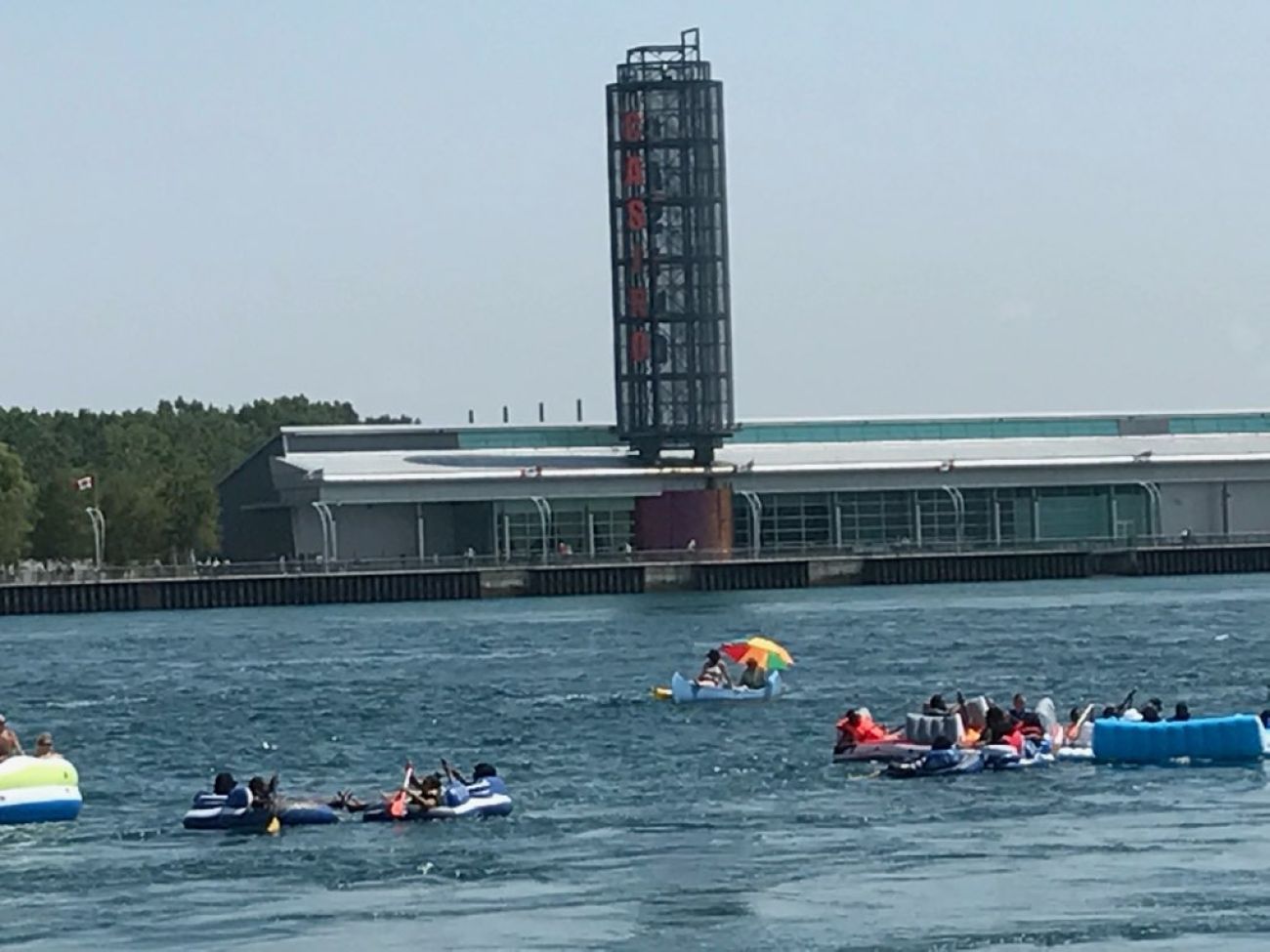Coast Guard throws cold water on annual Port Huron river float

- The 16th annual Port Huron Float Down is expected to draw over 5,000 rafters
- Many participants need to be rescued from the St. Clair River each year, locals say
- Despite Coast Guard warnings, local law enforcement encourages families to participate safely
The U.S. Coast Guard is cautioning revelers from taking part in Port Huron’s annual summer float down the St. Clair River, a warning that isn’t likely to deter thousands from taking inner tubes and beer into the water separating Michigan and Canada on Sunday.
The “Float Down,” a kinder, gentler version of Detroit’s Jobbie Nooner, has been a tradition in Port Huron since 2009. Thousands of rafters gather on the third Sunday in August to float eight miles down the St. Clair River from Lighthouse Beach, directly north of the Blue Water Bridge, to Chrysler Beach in Marysville.
The tradition is unsanctioned by any group, and has had its share of danger for participants.
Related:
- Michiganders get ready for the ‘biggest, brightest’ moon so far this summer
- Michigan warns residents to report invasive Asian longhorned beetle
- Michigan officials ask for federal disaster declaration for cherry industry
In 2014, a 19-year-old participant drowned. Two years later, strong winds blew thousands onto the Canadian shore, inconveniencing Coast Guard rescuers and border authorities.
Paul Ditrepani was among those who made an unscheduled international trip during the 2016 Float Down.
The Coast Guard was forced to pick him up after he crossed the international boundary line.
“We were on the boat for a while, picking other people up who floated off,” he said. “It was still fun.”
“More than 5,000 people are again anticipated to float down the river this year,” the U.S. Coast Guard said in an Aug. 5 statement.
“Medical emergencies, people drifting across the international border and people trespassing on residential property when trying to get out of the water before the designated finish line are some of the numerous difficulties encountered.”
This year, federal, state and local officials are coordinating to provide emergency services onsite. Vessel traffic on the U.S. side of the border will be restricted during the event, from noon to 7 p.m.
“While it is a fun activity, a great way to cool down and a unique way to see the shoreline, safety is of utmost importance,” stated the St. Clair County Sheriff’s Office in a Facebook post Wednesday.
Lucy Wisson has taken part in the float in the past. She recommends participants come prepared.
“I didn’t realize we were going to be out on the water for so long,” Wisson said. “I was out there for over four hours.”
The U.S. and Canadian Coast Guard strongly advised against participation in a joint statement Monday, but will not bar anyone from the event as long as those under the age of 18 are wearing an approved life vest.
The statement encourages those who participate take the following precautions:
- Wear a properly fitting, approved personal flotation device or life jacket at all times.
- Bring waterproof bags for personal items and legal identification.
- Bring a paddle. The St. Clair River’s fast-moving current is not suitable for uncontrollable craft.
- File a “Float Plan” with someone not participating in the event, who can report your intentions to first responders in the event you do not check in at the scheduled time.
- Do not go alone. Use the buddy system, keep an eye on each other and immediately report any distress to the nearest emergency response representative.
- Do not consume alcohol.
- Dress appropriately for the weather and cold water. Use a raft that limits immersion in the water.
- Stay near shore and remain out of the navigation channel.
- Mark floats with names and contact information and take all floats when exiting the river to avoid any unnecessary searches. Empty flotation devices signify to first responders someone may be missing.
Michigan Environment Watch
Michigan Environment Watch examines how public policy, industry, and other factors interact with the state’s trove of natural resources.
- See full coverage
- Subscribe
- Share tips and questions with Bridge environment reporter Kelly House
Michigan Environment Watch is made possible by generous financial support from:
Our generous Environment Watch underwriters encourage Bridge Michigan readers to also support civic journalism by becoming Bridge members. Please consider joining today.
See what new members are saying about why they donated to Bridge Michigan:
- “In order for this information to be accurate and unbiased it must be underwritten by its readers, not by special interests.” - Larry S.
- “Not many other media sources report on the topics Bridge does.” - Susan B.
- “Your journalism is outstanding and rare these days.” - Mark S.
If you want to ensure the future of nonpartisan, nonprofit Michigan journalism, please become a member today. You, too, will be asked why you donated and maybe we'll feature your quote next time!






